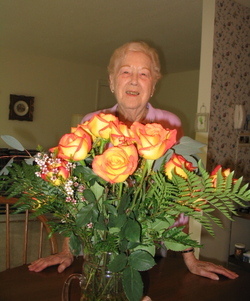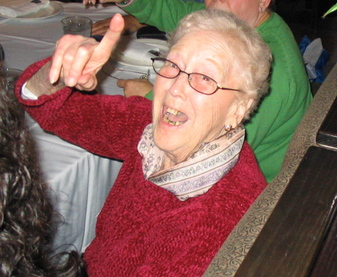 Shloshim is the number 30 in Hebrew, and this past Tuesday morning, immediately following Shacharit, the morning prayers, marked 30 days since my mother Elsie's burial. I have been going to synagogue daily to davven and to say Kaddish for her. When the moment arrives to stand and remember, the service leader asks everyone to share the name of the person whom s/he is saying Kaddish for. I say, "My mother, Elsie Novak, Osnat bat Moshe Bayer haCohen v'Nachuma." The mourners and those observing yahrtzeit proceed to say the words together, the text of the Jewish mantra which dating back to the 1st C BCE, words which serve to sanctify all life, as we gently guide the soul of our loved ones back to their source. While saying Kaddish last night I began to cry. The tears came not from immediacy of my mother's death, that has subsided with time, but rather from a fear that after only 30 days the recitation of the Kaddish was already feeling somewhat rote, routine, and G!d forbid, mundane. I don't want my remembering to become distracted habit, I want it to stay fresh and vibrant and heart-opening. How had 30 days had passed so quickly? The truth of that saddened me. The text of the Kaddish is engraved in me. I do not need to read it from the siddur. יהא שמה רבא מברך... With my hands free my mind began to wander. I heard the echo of a word that my mother used to use: PLICHING When it was raining very, very hard, my mother would say that "it's pliching out." I never had had any impulse to research the origin of the word, but during shiva, when many things have time to surface, I took the opportunity to pick up my English-Yiddish dictionary, and sure enough, there it was: פליוכרעגן (someone please help me with the pronunciation here). I smiled, and acknowledged that it had taken me all of my life to look up the word that my mother used so often. Why had it taken until now? More tears welled up. The Kaddish continued, לעלא מן כל ברכתא ושירתא Another word arose in my consciousness, KAMMONDAVING. My mom used this word to mean making a racket, or commotion, as in "Who needs all that kammondaving around the house." I was less successful finding any origin of this word in the dictionary. Perhaps my mother had made it up? The sense of the word did play a role before shiva started. I had decided that although I would let my various communities know of my loss, I was not going to advertise the times that we would be sitting shiva. I don't like the vibe after prayer, which more often than not turns into a loud social gathering as opposed to being in a house of mourning. I questioned my decision not to make the times public, but at one point realized, "That's my mother! She wouldn't have liked all the kammondaving in the house." Another way that my mother lives on through me. I have 10 months left to say Kaddish for my mom. The ritual will take me through the winter, spring, summer, and fall; through the entire year's cycle of holidays; through planting and tending and reaping and finally again laying to rest my beloved garden; through watching the budding of our lilac tree, until it flowers, when I will bend a branch to my nose, a havdalah moment, and I will gather in my mother's favorite fragrance. I will then say out loud, "Hello Mamale"; through another baseball season where every batter's intention is to circle the bases and return home. עשה שלום במרומיו הוא יעשה שלום... I wipe the tears from my eyes, and a sense of peace comes over me. Death, burial, shiva, shloshim; minyan, kaddish, breathe. אמן Amen  Minyan Oneg Shabbat has been offered a Matching Grant up to $1500. As of 12/11 only $418 more to raise by 12/31! Please consider offering a tax deductible donation of $18 or more to support this project and the work of DC's Jewish Renewal community Minyan Oneg Shabbat. All proceeds go to providing us with rental space and the ability to dream a little bigger.
1 Comment
My week of shiva was a profound experience, and I am grateful to everyone who took the time to touch base with me, whether by phone or FaceBook, e-mail or of course, by paying a shiva call or by your presence at one of the three shiva minyanim at my home. From time to time I will be sharing some reflections on my mourning journey. I welcome you to share thoughts from your own shiva experience. If you do so, please post it on this blog as opposed to Facebook. The power of Jewish practice during mourning. I write this as thousands mourn those slain in this week’s Jerusalem massacre. I cannot begin to imagine the grief of those who will be mourning there in the days and weeks to come. My experience is obviously a different one. What is common is that community will gather around the mourners and hold them within the structure that has been built with חסד- kindness - by those who came before us. How indebted we are to their insight, and to the container that is shiva, shloshim, and shana. Already I have begun to sense the process beginning to work - from mourning, to harvesting, to integration. The process is not a linear one, and I can powerfully feel that it will remain active within me for a long time to come. ¨¨¨¨¨¨¨¨¨¨¨ I was pleasantly surprised by the emotional power of Facebook. Many of you read my original post about my mother’s passing. It received the highest number of hits of anything I have ever posted, over 300 in 3 days on FB and on Weebly where my blog is hosted. Many of you posted condolences, and some of you IM’d me, including just this second, someone who I have not spoken to or seen for perhaps 25 years and who has never met my mother! He wrote: “Just saw your brother in law in Denver and he told me about your recent loss. I am very sorry to hear the news. May you and your family be blessed with nechama, comfort and support.” How blessed I am. News travels fast in our small, tightly woven Jewish world. I sometimes joke that there are only 36 Jews in the world and we all run around in circles, making contact with each other over and over again. As a mourner, I feel sonsolation from being held by my community. ¨¨¨¨¨¨¨¨¨¨¨¨ I could not help but notice that several people commented on my sister’s FB page: “Is there anything that I can do?” or “Please let me know what I can do?” Not to say that we Jews have a monopoly on kindness, but these offers came from non Jews. Yidn are blessed to have a response in the form of action already put in place by tradition. Renée shared with me that a non-Jewish friend of hers was so moved by Renée’s experience during the mourning process after her mother died that the friend took on a similar practice after the loss of a loved one in her life. Such is the power of our tradition. We don’t offer - we do. One friend offered to pick me up from the train station when I arrived post burial in DC from NJ; another sent a platter of food that lasted all week; another showed up with a carload of food that could feed an entire town, bought by monies collected from 8 other friends; each night 25-30 friends showed up for shiva minyanim, listened to me tell stories about my mom, sang with me, prayed with me, laughed with me, and then knew when to leave, all except the few who lingered to ease my transition from full house to being alone with my thoughts once again. |
Mark Novak is a "free-range" rabbi who lives in Washington DC and works, well, just about everywhere. In 2012 he founded Minyan Oneg Shabbat, home to MOSH (Minyan Oneg Shabbat), MindfulMOSH (Jewish mindfulness gathering), and Archives
June 2017
Categories
All
|

 RSS Feed
RSS Feed
